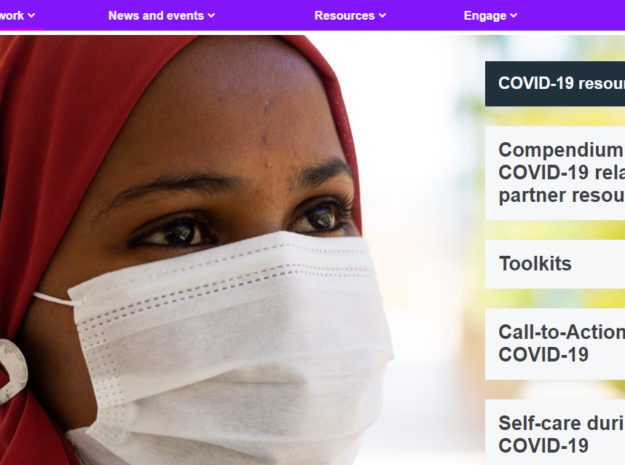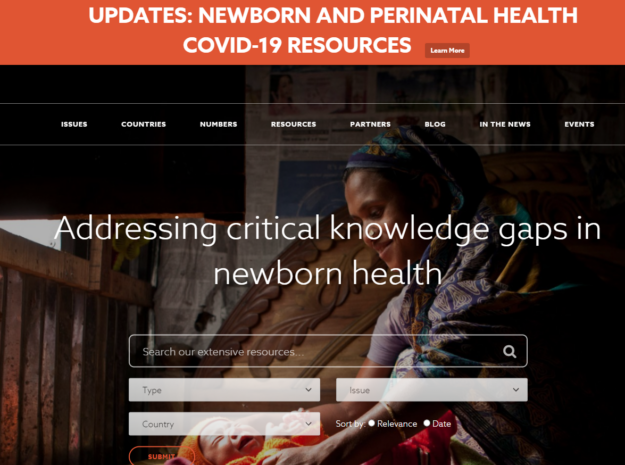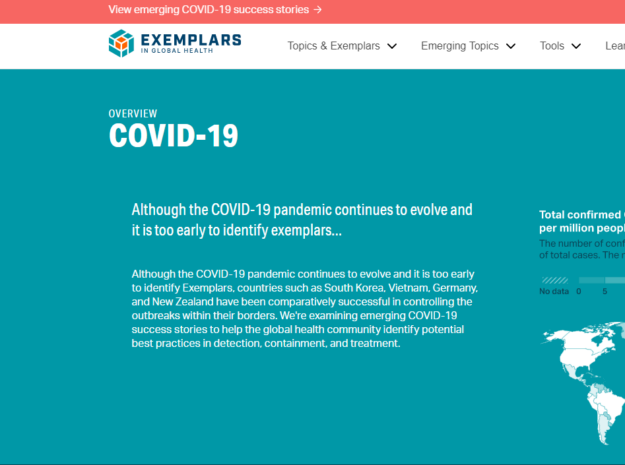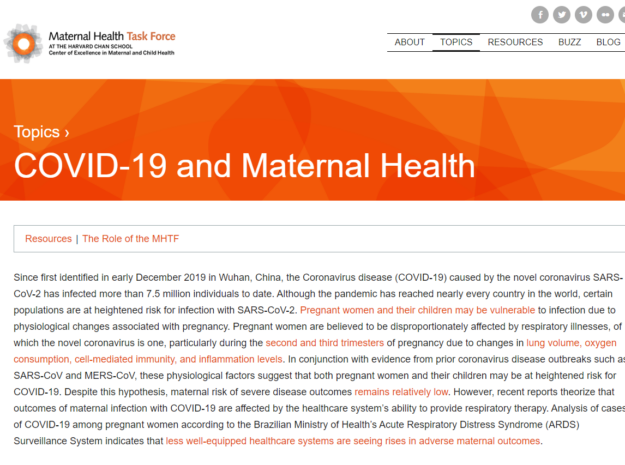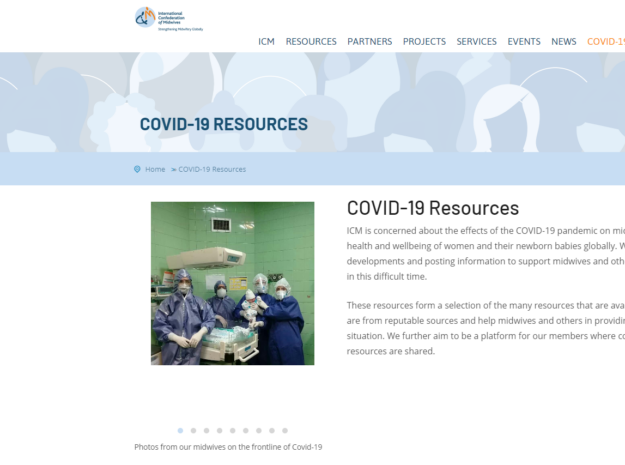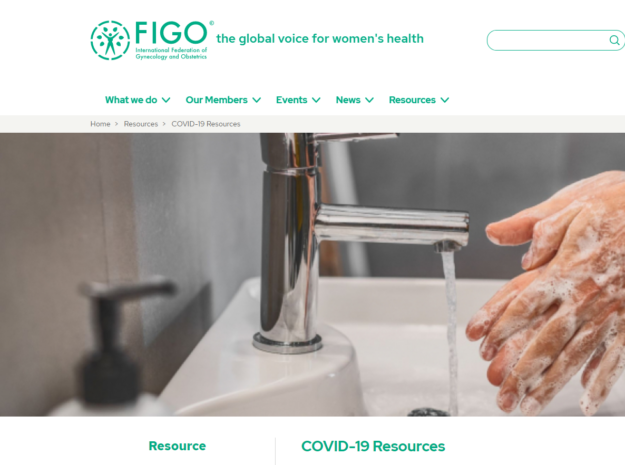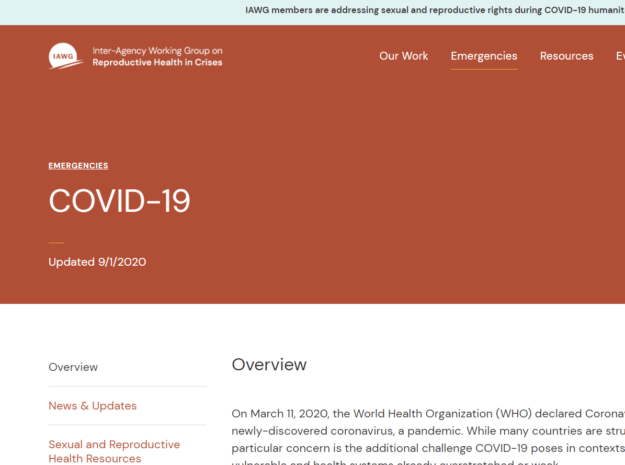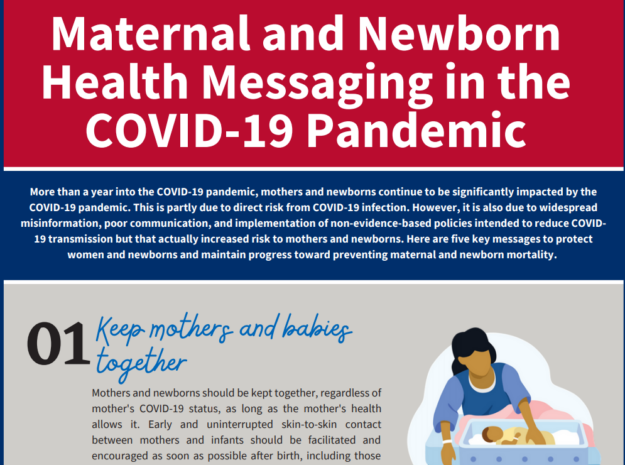Since March 2020, when the World Health Organization declared COVID-19 a pandemic, service interruptions, lockdowns, and economic hardship have exacerbated the existing challenges that many families face in accessing quality, timely maternal and newborn healthcare.

Over the past year, countries worked to adjust their healthcare budgets, infrastructure, and workforce to urgently respond to COVID-19. This redirection of resources to COVID-19, coupled with decreased numbers of women and families accessing services, threatens to undermine important gains in key MNH indicators in recent years.
The pandemic exacted a burden on women’s safety and physical and mental health all over the world. [1][2] It also made the most vulnerable populations even moreso. Without a concerted effort to maintain the provision of essential MNH care, one study estimates that pandemic-focused approaches could lead to over 30% more maternal and newborn deaths. [3]
These stark realities offer an opportunity for renewed global and national commitments to ensure safe continued access to quality essential services for women and newborns. Decision-makers and program planners have an opportunity to sharpen the collection and use of data, and to use context-specific findings to strengthen systems that are prepared to adapt to this, or a future, pandemic.
COVID-19 Resource Highlights
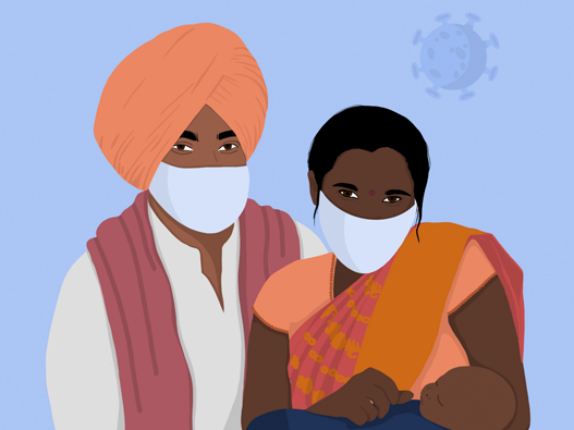
AlignMNH has compiled an initial set of COVID-19 resources. We look forward to growing this page, adding useful resources, links, and implementation experiences.
This global report presents a synthesis of information across 19 countries in five WHO Regions, including lessons learned between May 2020 to February 2021on the indirect impacts of COVID-19 on maternal, newborn, child and adolescent health and ageing (MNCAAH) services. It also includes more detailed individual country information, drawn directly from country Thematic Working Group (TWG) and national consultant reports, country health information management system (HMIS) data, research publications and surveys that describe the impact of COVID-19 on MNCAAH services.
Preeclampsia and COVID-19: Results from the INTERCOVID Prospective Longitudinal Study. American Journal of Obstetrics and Gynecology, 2021
This study aimed to quantify any independent association between COVID-19 during pregnancy and preeclampsia and to determine the effect of these variables on maternal and neonatal morbidity and mortality. In this study, COVID-19 during pregnancy was strongly associated with preeclampsia, especially among nulliparous patients. This association was independent of any risk factors and preexisting conditions. The severity of COVID-19 infection did not seem to be a factor in this association. Both conditions were associated independently of and in an additive fashion with preterm birth, severe perinatal morbidity and mortality, and adverse maternal outcomes. The authors concluded that preeclampsia seems to be a strong risk factor for SARS-CoV-2 infection and its related complications.
- Implications:
- Those who are at high risk for preeclampsia should also be considered at higher risk for COVID-19 and should be included in all preventive strategies during the pandemic.
- Patients with preeclampsia should be considered a particularly vulnerable group with regard to the risks posed by COVID-19.
A total of 43 institutions in Argentina, Brazil, Egypt, France, Ghana, India, Indonesia, Italy, Japan, Mexico, Nigeria, North Macedonia, Pakistan, Russia, Spain, Switzerland, the United Kingdom, and the United States contributed to the study.
The effect of COVID-19 on maternal newborn and child health (MNCH) services in Bangladesh, Nigeria and South Africa: call for a contextualized pandemic response in LMICs. International Journal for Equity in Health
This article suggests a four-point contextualized mitigation plan to safeguard MNCH care during the pandemic using the observed countries (Bangladesh, Nigeria, and South Africa) as exemplars for LMIC health system adaptations to maintain the trajectory of progress regarding the SDGs
This 2021 comprehensive report from Joint WHO-UNICEF –UNFPA Initiative for SRMNCAH Programme Officers from the ministries of health and UN Partners shares 1) findings from a rapid survey of the situation of delivery of essential SRMNCAH services during March-April 2020 and 2) a summary of national plans for continuation during the COVID-19 pandemic and lockdown periods and innovative strategies to protect and deliver services during lockdown and in containment zones, and 3) lessons learned – what worked well and what challenges were faced. Select takeaways about some of the innovative strategies countries’ used include, “Incentives were given to frontline workers help maintain services; online training on IPC, MNCAH services have been conducted and strong collaboration between the government and partner organizations helped in the continuity of services. Health workforce surge plans were used like redeploying staff from non-affected areas and health facilities, utilizing physically fit retirees for nonCOVID-19 service roles, and hiring non-governmental and private sector health workforce. Tele-medicine options were used to minimize physical contacts. Supply-side logistics for essential commodities including personal protective equipment were strengthened quickly.”
Effects of COVID-19 on Essential MNCH/FP/RH Care and the Strategies and Adaptations Emerging in Response: Rapid Evidence Summary USAID MOMENTUM, 2020
Reviews emerging evidence of the effects of COVID-19 on provision and demand of essential MNCH and nutrition, family planning, and reproductive health care, the strategies and adaptations emerging in response, and their effects.
Maternal and newborn care during the COVID-19 pandemic in Kenya: re-contextualizing the community midwife model Human Resources for Health, 2020
The authors of this October 2020 article propose a response to the COVID-19 pandemic in Kenya that could decrease avoid unnecessary movement in communities, decrease the burden on hospitals, and minimize the risk of COVID-19 infection among women and their newborns: strengthening community-based midwifery.
PMNCH has developed seven knowledge-to-action briefs support partners to carry forward the PMNCH Call to Action on COVID-19, which aims to increase investment and policy support to mitigate the devastating effects of the COVID-19 pandemic on the health of women, children and adolescents, and the societies and economies that support them. The knowledge-to-action briefs synthesize relevant evidence to the COVID-19 Call to Action, focusing on: 1) key impacts of COVID-19; 2) policies and mitigation strategies; and 3) strategic gaps in knowledge and action, including in humanitarian and fragile settings. See all Knowledge to Action Briefs
Optimizing the World Health Organization COVID-19 Interim Guidance, Reproductive Health Supplies Coalition, 2020
This document provides working recommendations for sexual and reproductive health (SRH) during the pandemic. Compiled with input of both global and local organizations, the document provides recommendations for policy, program, and budgetary considerations for implementing the WHO guidance for SRH during the pandemic. The recommendations also include guidance for country-level adaptations of the WHO guidance.
Interim guidance to help national and sub-national decision-makers monitor and analyze the impact of COVID-19 on essential health services. Provides practical recommendations on how to use key performance indicators to analyze changes in the delivery of essential health services during the COVID-19 pandemic; how to visualize and interpret these data; and how to use the findings to guide modifications for safe delivery of services and transition towards restoration and recovery.
COVID-19 Essential Health Services Policy Tracker PATH
The COVID-19 Policy Tracker project, aims to collect, catalogue, visualize, and disseminate government policy responses and other relevant information related to maintaining and adapting essential health services during COVID-19.
Maternal, Neonatal and Child Health Surveillance during COVID-19 US Center for Disease Control and Prevention
From the CDC, this website offers clear guidance on MNCH surveillance for COVID-19 including pregnancy surveillance, birth surveillance, postpartum/postnatal surveillance, and mortality surveillance (in both community and facility settings).
COVID-19 in pregnancy: evidence from LMICs Lancet, 2022
The authors commend a recent study by Leonard Mndala and colleagues published in The Lancet Global Health “Comparison of maternal and neonatal outcomes of COVID-19 before and after SARS-CoV-2 omicron emergence in maternity facilities in Malawi (MATSurvey): data from a national maternal surveillance platform.” They stress that data on the burden of COVID-19 on maternal and perinatal outcomes in sub-Saharan Africa and other areas in LMICs are under-represented in the medical literature; higher income settings are more likely to have structured surveillance systems on health outcomes which allow for a fast response and uptake of data to support policymakers. They write, “To implement measures to avoid preventable mortality in under-resourced settings, we need the data and we need action.”
WHO Academy COVID-19 Mobile Learning App
Available in six languages, the app delivers mobile access to a wealth of COVID-19 knowledge resources developed by WHO, including up-to-the-minute guidance, tools, training, and virtual workshops to support health workers in caring for patients infected by COVID-19.
Recommendations for MNH during COVID-19 USAID MOMENTUM, 2021
A series of short job aids to assist providers and facility managers in modifying antenatal, intrapartum, and postnatal care and protecting life-saving, evidence-based care during the COVID-19 pandemic.
Toolkit: MNH during COVID-19 PMCNH
PMNCH has produced a toolkit on ‘Maternal and Newborn Health during COVID-19’ as part of its Toolkits Series on COVID-19 and Women, Children and Adolescent Health. This toolkit aims to provide access to relevant guidance, tools and resources that can be useful to respond to and advocate for the unique needs of women and newborns during these times.
Supporting breastfeeding during COVID-19 USAID MOMENTUM
This resource provides a review of evidence and recommendations for facilitating and protecting breastfeeding during the COVID-19 outbreak.
COVID-19, Breastfeeding, Infant Feeding, and Breast Milk Johns Hopkins Center for Humanitarian Health
This repository is compiled by the Johns Hopkins Center for Humanitarian Health and provides an overview of what peer-reviewed journal articles currently state on COVID-19, breastfeeding, infant feeding, and breast milk. Updated with a snapshot of what is published every two weeks.
Q&A: COVID-19 and breastfeeding WHO
This WHO Q&A provides answers on breastfeeding when COVID-19 infection is suspected or confirmed.
Breastfeeding and COVID-19 Scientific Brief WHO
This scientific brief examines the evidence to June 2020 on the risks of transmission of COVID-19 from an infected mother to her baby through breastfeeding as well as evidence on the risks to child health from not breastfeeding.
Questions and Answers: COVID-19 Vaccines and Pregnancy. World Health Organization. 15 February 2022.
These questions and answers (Q&As) are based on the most recent interim recommendations from the WHO Strategic Advisory Group of Experts on Immunization (SAGE) for COVID-19 vaccines that have been approved by WHO under Emergency Use Listing as of 15 February 2022.
Coronavirus disease (COVID-19): Vaccines Safety, Statement by WHO on Vaccine Safety during Pregnancy and Breastfeeding, 2021
The World Health Organization (WHO) makes a statement on vaccine safety for people who are pregnant, plan to become pregnant, or are breastfeeding.
IMC Statement: Women’s Rights in Childbirth Must Be Upheld during the Coronavirus Pandemic
ICM states that it is essential that protocols for pregnancy and childbirth during the Coronavirus pandemic are evidence-based and uphold the human rights of all women and their newborns. This includes permitting a single, asymptomatic birth partner to stay with the woman during pregnancy and birth.
COVID-19 Technical Brief Package for Maternity Services UNFPA
This interim guidance from UNFPA, published in July 2020, supports UNFPA’s 3-pronged approach to the COVID-19 pandemic within maternity care settings: 1) protect maternity care providers and the maternal health workforce, 2) provide safe and effective maternity care to women, and 3) maintain and protect health systems.
Q&A: COVID-19 – Pregnancy and Childbirth WHO
This WHO Q&A addresses common concerns and questions about the impact of COVID-19 on pregnancy and birth care and practices.
From Our Blog. Understanding Impact to Guide Recovery from COVID-19. By Gagan Gupta.
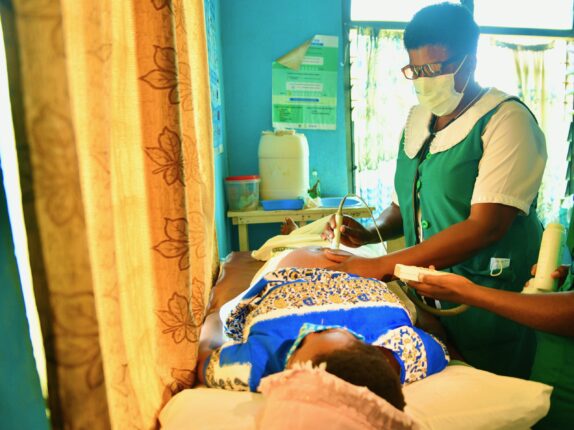
A UNICEF-led analysis of access to essential health services during the COVID-19 pandemic reveals several macrotrends that should be considered as countries recover from the pandemic. The analysis also highlights the important of not only tracking the coverage of essential health services, but also, the quality. Data should guide recovery planning as countries aim to build more resilient health systems. — more —
Visit partner organizations to find compilations of COVID-19 resources, toolkits, interim guidelines and syntheses of MNH COVID-19 information.
These assets, job aids, short summary videos, highlight country recommendations on maintaining service delivery during COVID produced during a Service Delivery Learning Program facilitated by the Global Financing Facility in 2020. Includes practical recommendations from country and global leaders.
PMNCH has developed a comprehensive compendium of resources that brings together the latest evidence-based information on women, children and adolescent health in the context of COVID-19. Find toolkits, knowledge summaries and COVID-19 partners resources on topics including pregnancy and breastfeeding, children, adolescents, sexual and reproductive health rights, gender and empowerment, humanitarian and fragile settings, and many more.
COVID-19 Interim Guidance: HNN has compiled programmatic information, interim guidance, webinars and other resources related to newborns and the COVID-19 pandemic.
Exemplars is examining emerging COVID-19 success stories to help the global health community identify potential best practices in detection, containment and treatment.
This compendium, compiled by the Maternal Health Task Force (MHTF), offers recent publications, documentation and reports, blog posts, etc. The MHTF is actively synthesizing and disseminating information on COVID-19 and maternal health as it becomes available, and offers a summary of current evidence.
ICM posts information to support midwives and other maternity care professionals during the COVID-19 pandemic. Selected resourced (including ICM statements, resources for midwives and other providers, information for pregnant women, and resources on COVID-19, gender, and SRHR) are listed here help midwives and others in providing care in an unprecedented situation.
Representing a global membership of obstetricians and gynecologists, FIGO had sourced and organized COVID-19 resources by a number of sub-topics related to women’s and maternal health. Resources shared by national member societies are also posted.
The Inter-Agency Working Group on Reproductive Health in Crises (IAWG), in collaboration with partners, has compiled a set of resources to support countries in maintaining sexual and reproductive health services in humanitarian settings during the pandemic. The resources include clinical and programmatic guidance, assessments, policy papers, and statements and are intended to bring a gender lens to the pandemic response. These resources are intended for humanitarian settings, where the pandemic further strains resources.
PATH is cataloging and analyzing the policies that governments in low- and middle- income countries are making to adapt and maintain essential health services during the COVID-19 pandemic. View the policy tracker, country spotlights and more.
More than a year into the COVID-19 pandemic, mothers and newborns continue to be significantly impacted by theCOVID-19 pandemic. This is partly due to direct risk from COVID-19 infection. However, it is also due to widespread misinformation, poor communication, and implementation of non-evidence-based policies intended to reduce COVID-19 transmission but that actually increased risk to mothers and newborns. Here are five key messages to protect women and newborns and maintain progress toward preventing maternal and newborn mortality.
Featured Topics
Global Financing Facility: Maintaining Essential Services
PMNCH
Healthy Newborn Network
Exemplars in Global Health
Maternal Health Task Force
International Confederation of Midwives
International Federation of Gynecology and Obstetrics
View Inter-Agency Working Group on Reproductive Health in Crises, COVID-19 resources
PATH Essential Health Services Policy Tracker
Maternal and Newborn Health Health Messaging in the COVID-19 Pandemic Infographic
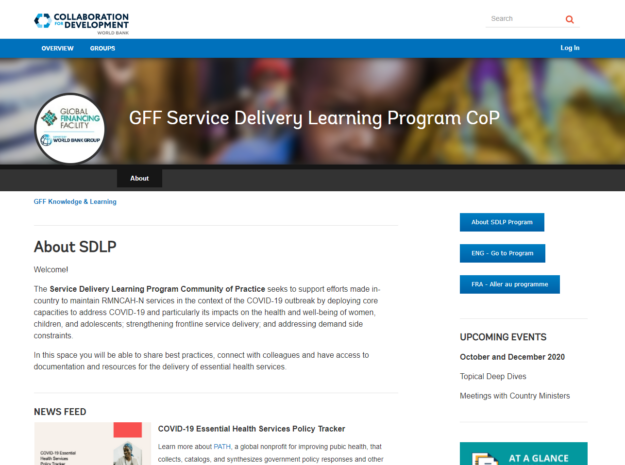
These assets, job aids, short summary videos, highlight country recommendations on maintaining service delivery during COVID produced during a Service Delivery Learning Program facilitated by the Global Financing Facility in 2020. Includes practical recommendations from country and global leaders.


